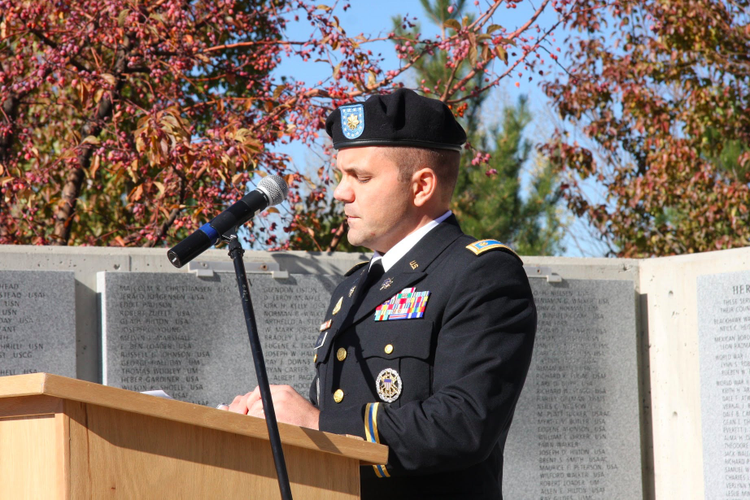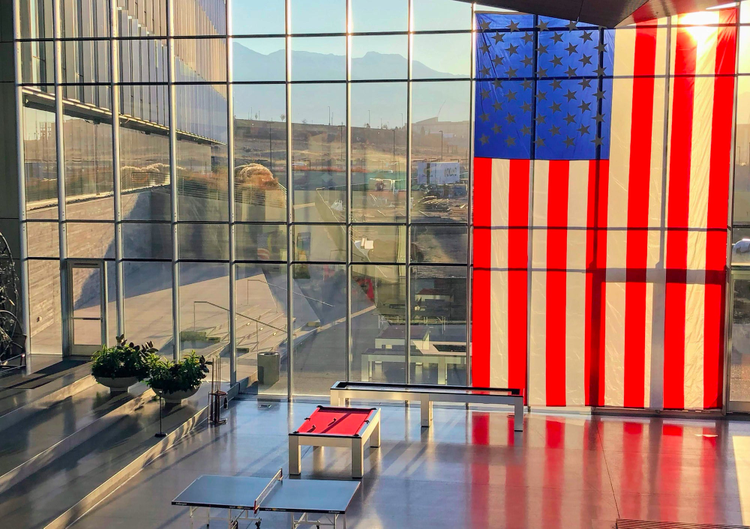Don’t assume you know someone’s story

In recognition of Veterans Day in the U.S. and Remembrance Day in Australia, Canada and across Europe, Adobe employee Michael Isom shares the story of how joining the military transformed his life and perspective toward the world.
Michael Isom vividly remembers the day his life reached a crossroads. His high school principal pulled him aside and asked him a simple but profoundly impactful question.
That’s because, as young man, Michael was on a slippery slope. By the time he finished high school, he had been in multiple alternative schools for delinquent students, had moved 13 times and was sometimes without a home. Even when he and his family moved to Georgia hoping for a fresh start, trouble followed.
That day in the hallway at school, the principal gestured to Michael’s classmates and said that a third of them would likely end up in prison, a third would struggle with poverty and a third would find success. “Which third do you want to be?” the principal asked.
Michael had seen friends and family set on unfortunate paths by a few bad choices, and he knew the principal was right. He also knew he had limited options. There was a community college nearby, but he couldn’t afford it — and so, after some deliberation, he explored another path that would guarantee food, shelter, and access to healthcare and education: the military.
Little did he know when he joined, Michael found that military service offered so much more than those things, and it opened his eyes to the experiences of people and places in ways he never anticipated. “The military literally saved my life, and what’s more, it launched me into a bigger and even more beautiful world,” he said. “I learned that we miss what makes us the same when we only focus on what makes us different.”
Michael shared his story during Adobe For All Week 2020, Adobe’s annual internal Diversity & Inclusion event, and described how the military allowed him to set aside his personal fears and biases to discover a thriving, interconnected global community. We talked with him about his goal to use storytelling to dispel misconceptions about the military and how he’s come to believe that listening to the stories of others can literally make the world a better place.
Q: Why did you feel it was important to share your story broadly with employees?
I think there are a lot of misconceptions about the military and military service, even here at Adobe. In addition to the military saving my life, I have personally witnessed countless acts of kindness and compassion through my service. I think those perspectives often don’t get represented.
We’re all always learning about each other — and that’s the purpose of Adobe For All! I’m really grateful that veterans can be part of that dialogue.
Q: What emotions did you experience as you prepared to tell your story?
Sometimes fading memories are a gift, allowing the mind to heal through the salve of time. Opening proverbial file cabinets that had long been closed brought up heartache, embarrassment, frustration, and even some anger, but it also deepened my humility, empathy and gratitude.
It’s hard to be vulnerable. Digging back into those memories brought emotions and experiences to the surface that I had forgotten about. It also helped me to better reflect on my story and my journey.
Q: Did you learn anything about yourself through this process?
Being vulnerable isn’t typically in my nature. Projecting that I’m always strong, always have the answer and am always in control is a fallacy — and it can be an emotional, mental and even a physical liability. I’ve come to more deeply appreciate the power of story in sharing perspectives and personal experience.
I addressed this in my video, but always being the new kid and not exactly accepted led to me being bullied and disrespected. Revisiting those memories was hard, but it also made me see how meaningful it is that the military was a lifeline to me in many ways.
I think by looking back and recognizing where individuals or organizations have helped lift me, it helps me remember to pay it forward.
Q: You had 7 minutes to share your story during Adobe For All Week. Is there anything you weren’t able to include in your video?
There are painful memories from my past that I didn’t include because, the more I reflected, the more I realized that no good would come from talking about the shortcomings or mistakes of others solely to give more hues to the palette of my own story.
I also wasn’t able to share many of the profound experiences I’ve had in the military. I saw Israelis and Palestinians work side by side. I had adventures with my family across the Middle East. I got to participate in the inauguration of President Obama. I gained a better understanding of the deep cultural histories of East Asia, and so much more. Without the military, I would have missed so much.
Q: How has your military experience changed your preconceived notions?
I learned the power of understanding and empathy. When I first went to Afghanistan and that part of the world, I believed the crude stereotypes and initially viewed everyone as a threat. That’s not a healthy way to look at things, but my perspective changed once I interacted with people. For example, I watched Muslims and Hindus devoutly practice their faith, and my own faith deepened because of that. In the Israel-Palestine area, I saw how basic human needs prevailed above everything else: community, providing for your family, having stable work, physical safety. Those are the things we all crave.
Q: Have you been surprised by the response you received from other Adobe employees?
I’m overwhelmed by the number of people who have reached out to me and the number of meaningful conversations I’ve been able to have. Somebody reached out to me to say their son is in the same place I was 25 years ago and that I gave them inspiration and hope for the future. I can’t take credit for that, but if anything I said or went through can help give others hope or perspective, it was worth it to me. However, I was surprised people didn’t ask more questions.

Adobe’s Lehi office in Utah displaying the American flag
I’m not naive enough to think that one story is going to change somebody’s mind about the military, but I had hoped that there’d be more questions about Iraq or Afghanistan, or even current events. I think sometimes people feel that questioning is akin to criticizing, but I believe questions can help build bridges of understanding, collaboration and compassion.
What takeaways do you hope people will get from your story?
Too often we see, and even accept, caricatures and stereotypes, whether that’s about the military in my case, or gender, religion, race, ethnicity, sexual orientation or others. I believe our vision about other people remains blurred until we invest time and empathy towards seeing what unites us rather than what makes us different.